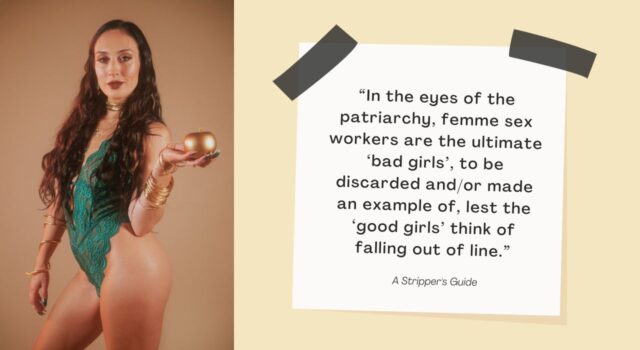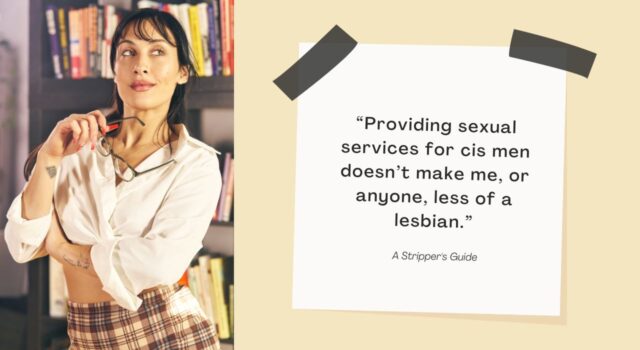When I realized I was queer, I’d already been a stripper for three years. Ever since then, a similar scene has repeated itself in strip club locker rooms all over the country: when the girlies find out I’m gay, some random dancer inevitably says, “I’m jealous! Being a lesbian must make this job so much easier!”
This assumption about lesbian strippers is twofold: the first is that, if our romantic partners aren’t cis men, they don’t get jealous of our customers (ha!). The second is that, if we’re not interested in dating cis men, we don’t mind disrespectful customers as much as our straight coworkers do. These presumptions are not only inaccurate; they increase the vulnerability of queer sex workers experiencing abuse, whether from partners or customers.
The world at large is finally catching on to the idea that masculinity has nothing to do with gender. Just as importantly, misogyny has nothing to do with gender, either. Like most people, during my formative years I was conditioned into patriarchal beliefs about masculinity and femininity. Until I learned to think critically about the ways I understood myself and others in those terms, I, like so many, went right along upholding larger cultural ideas about gender roles.

There is a heteronormative logic that damns femmes and women worldwide: you’re either a “good girl”, worthy of a pedestal (so long as you walk an impossibly narrow path and never displease anyone), or you’re a “bad girl”, and deserve to be punished. In the eyes of patriarchy, femme sex workers are the ultimate “bad girls”, to be discarded and/or made an example of, lest the “good” ones think of stepping out of line.
Queer sex workers are not automatically safe from misogynistic partner abuse, even if our partners aren’t cis men. Unfortunately, I know this not only from watching it happen to colleagues, but also, because it happened to me. For a few years in the middle of my stripper career, I was caught inside an abusive lesbian relationship with someone I’ll call “Nic.” When I met Nic, I was fresh into my self-exploration as a queer person. While Nic had never been sexually intimate with a cis man, I certainly had. One of their control tactics was to shame me for that fact, and also to regard it as “evidence” that I’m not actually queer. Then, on the grounds that I’m “secretly straight,” they would accuse me of sleeping with my male friends and my strip club customers.
Nic’s accusations felt like an attack on, and a rejection of, my identity. I had tried to explain to them that, just like everyone else, most sex workers go to work for money – not for our own sexual pleasure. All sex workers deserve partners who trust us to establish and maintain our professional boundaries with our customers.

Unfortunately, my experience with Nic isn’t uncommon. One of the most pervasive anti-femme/anti-sex worker stigmas is that we are untrustworthy. When our partners regard us as unreliable narrators of our own lives, it becomes impossible for us to gain solid footing inside our relationships. Nic ultimately refused to understand that providing sexual services for cis men doesn’t make me, or anyone, less of a lesbian, and that’s one of the main reasons why our relationship ended.
There’s another layer to this messy cake. For all the ways lesbian strippers may be misunderstood by our lovers, our fellow sex workers frequently misunderstand us, too. I’ve had colleagues assume that, because I’m queer, I don’t really mind when customers are shitty to me. The first few times I heard this from other dancers, I was baffled. My own experience made it hard to understand why they would believe such a thing; I started stripping back when I thought I was straight, and absolutely nothing changed about my relationship to my job once I realized I was queer. Difficult customers were still just as much a pain in my ass as they’d always been. Scary customers were still just as scary. The idea that lesbians are less affected by demanding, manipulative, or aggressive cis men, simply because we don’t date them, is, bluntly, a dismissal of reality.
To assume that queer sex workers are immune to the dangers, exhaustion, and frustration of patriarchy is to leave us stranded off the liferaft of feminism. We struggle just as hard, if not harder, against misogyny – at work and, often, at home. Because sex workers frequently have to deal with mistreatment, oppression, and isolation outside the industry, solidarity within the industry is essential.
Queer and femme sex workers deserve to be affirmed. For this to be possible, we all need to support, uplift, and listen carefully to the voices of the queer sex workers in our lives, our communities, and in the world at large.
Resources for people experiencing/recovering from partner violence:
- TNLR (The Network/La red) – Bilingual (English/Spanish) support for survivors of queer partner abuse
- National Domestic Violence Hotline
Resources from A Stripper’s Guide:
- So, You Wanna Date a Stripper? – Relationship support for sex workers and their partners in the form of a Spotify playlist of episodes from my podcast
- Femme Solidarity – Spotify playlist of episodes from my podcast
- A Stripper’s Guide Blog
- More at www.astrippersguide.com


What Do You Think?